|
|
|
Sort Order |
|
|
|
Items / Page
|
|
|
|
|
|
|
| Srl | Item |
| 1 |
ID:
106796
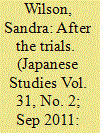

|
|
|
|
|
| Publication |
2011.
|
| Summary/Abstract |
'Lesser' Japanese war criminals, or those in Classes 'B' and 'C', were prosecuted by the various Allied powers in courtrooms around Asia after the Second World War. They were then executed or imprisoned in the places in which they had been tried. By the end of 1953, however, all surviving prisoners had been repatriated to Japan to serve out the remainder of their sentences, and by the end of 1958, all had been released. The decision to repatriate or release prisoners was made by the governments that had tried the war criminals, even after Japan regained its sovereignty in 1952, since the San Francisco Peace Treaty stipulated that the prosecuting countries retained the right to decide on any variation of the prisoners' sentences. The fate of convicted war criminals, therefore, was subject to diplomatic negotiation between Japan and the original prosecuting countries. These negotiations played an important role in the post-war reconfiguration of international relations in the East Asian region. Discussion about the repatriation and release of prisoners constituted one of the first topics of major international negotiation among a reconstructing Japan, the newly independent or decolonising nations of the region, the departing European imperial powers, a United States which was in the process of defining its Cold War aims in the region, and Australian governments seeking to establish a new foreign policy stance in the post-war world.
|
|
|
|
|
|
|
|
|
|
|
|
|
|
|
|
| 2 |
ID:
099721
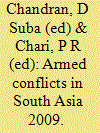

|
|
|
|
|
| Publication |
New Delhi, Routledge, 2010.
|
| Description |
xiii, 240p.
|
| Standard Number |
9780415564441
|
|
|
|
|
|
|
|
|
|
|
|
Copies: C:1/I:0,R:0,Q:0
Circulation
| Accession# | Call# | Current Location | Status | Policy | Location |
| 055381 | 355.0218054/CHA 055381 | Main | On Shelf | General | |
|
|
|
|
| 3 |
ID:
104838
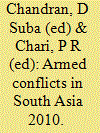

|
|
|
|
|
| Publication |
New Delhi, Routledge, 2011.
|
| Description |
xi, 233p.
|
| Standard Number |
9780415612562, hbk
|
|
|
|
|
|
|
|
|
|
|
|
Copies: C:1/I:0,R:0,Q:0
Circulation
| Accession# | Call# | Current Location | Status | Policy | Location |
| 056108 | 303.6405/CHA 056108 | Main | On Shelf | General | |
|
|
|
|
| 4 |
ID:
103756
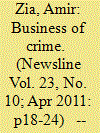

|
|
|
| 5 |
ID:
124363
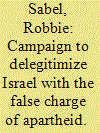

|
|
|
|
|
| Publication |
2011.
|
| Summary/Abstract |
The comparison of Israel to South Africa under white supremist rule has been utterly rejected by those with intimate understanding of the old Apartheid system. Israel is a multiracial and multi-colored society, and the Arab minority actively participates in the political process. Incitement to racism in Israel is a criminal offence, as is discrimination on the basis of race or religion. The accusation is made that the very fact that Israel is considered a Jewish state proves an "Apartheid-like" situation. Yet the accusers have not a word of criticism against the tens of liberal democratic states that have Christian crosses incorporated in their flags, nor against the Muslim states with the half crescent symbol of Islam. For Arab states to denote themselves as Arab Republics is not objectionable.
|
|
|
|
|
|
|
|
|
|
|
|
|
|
|
|
| 6 |
ID:
098158
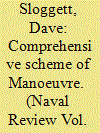

|
|
|
| 7 |
ID:
104329


|
|
|
|
|
| Publication |
2011.
|
| Summary/Abstract |
Rather than examining networks of individuals as prior research has done, this study systematically examines the structure and composition of co-offending among types of criminal enterprise groups. Using social network analysis, the authors show that different types of crime groups tend to have unique co-offending patterns as measured by network composition and structure. The results also support the countercurrent of criminologists who suggest that ethnically derived categories may be misleading when trying to classify criminal enterprise groups.
|
|
|
|
|
|
|
|
|
|
|
|
|
|
|
|
| 8 |
ID:
098502
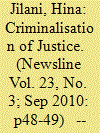

|
|
|
| 9 |
ID:
121436
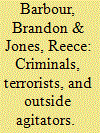

|
|
|
|
|
| Publication |
2013.
|
| Summary/Abstract |
This article is a critical geopolitical analysis of Chinese media representations of the 5 July 2009 riots in Xinjiang, China. Significant events often define the geopolitical climate by creating a space for the construction of boundaries between identity categories and the appropriate norms for behaviour towards the Other. The post-riot reports framed the event through the prism of the global war on terror to justify a violent response to protect Chinese citizens from the perceived threat of the Other. After connecting theories of narratives, the event, and group making, the article identifies three representational tropes - the criminal, the terrorist, and the outside agitator - in Chinese documents that create boundaries between the identity categories Uyghur and Han and define how the Other should be treated. The three representation tropes of the Other in the aftermath of the 5 July riots simultaneously situate the protestors as outside Chinese society and perpetuate the claim of the superiority of Chinese culture and civilisation.
|
|
|
|
|
|
|
|
|
|
|
|
|
|
|
|
| 10 |
ID:
111817
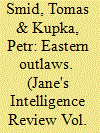

|
|
|
| 11 |
ID:
106799
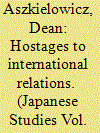

|
|
|
|
|
| Publication |
2011.
|
| Summary/Abstract |
While the Philippines was one of the last of the Allied nations to execute Japanese war criminals, it was also one of the first to allow for their repatriation and pardon. This article examines the period between the last execution of Japanese war criminals in January 1951 and the pardon of the remaining criminals in December 1953, in the context of international negotiations regarding the Philippines' position in the lead up to the San Francisco Peace Treaty and beyond. It traces the development and the strategies of the movement for the repatriation of war criminals in Japan. It argues that the repatriation of war criminals from the Philippines (and elsewhere) became an important domestic political issue in Japan in the period between 1951 and 1953, and that the extent of this domestic pressure was also recognised in the Philippines. In both countries, the repatriation of war criminals was linked in public discourse with progress on the negotiation of reparations, the last obstacle to the resumption of diplomatic relations between Japan and the Philippines.
|
|
|
|
|
|
|
|
|
|
|
|
|
|
|
|
| 12 |
ID:
107868
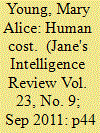

|
|
|
| 13 |
ID:
090362
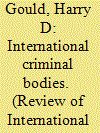

|
|
|
|
|
| Publication |
2009.
|
| Summary/Abstract |
One of the insights of Constructivism is that our world is, in part, made by what we say about it. We make things what they are by saying what they are. One way is through the use of metaphor; by asserting that one thing is another thing. Does our saying that a state is a person make it a person?
A way to intervene in this discussion is by addressing it not in the abstract, but guided by a cognate question: Can states commit crimes, a uniquely human act? If states can commit and be liable for crimes, they must be able to form intents. If they are indeed persons in the relevant sense, this is no problem; if their personality is trope, however, attribution of criminal responsibility becomes tenuous.
To analyse the issue, I trace the development of the trope of speaking of a group as if it were an individual from Roman Law, through to Hobbes, corporate law and IR Theory. Much hinges on Hobbes' elision of 'body' and 'person'. I conclude that it is too much to expect of a metaphor that it act, that it have reasons, beliefs, and desires, and that these sum to intentions.
|
|
|
|
|
|
|
|
|
|
|
|
|
|
|
|
| 14 |
ID:
093018
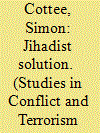

|
|
|
|
|
| Publication |
2009.
|
| Summary/Abstract |
On one night in October 2007, at an event organized by The New Yorker and chaired by Bill Buford, Martin Amis and Ian Buruma convened to discuss the theme of the monster in politics and literature.
|
|
|
|
|
|
|
|
|
|
|
|
|
|
|
|
| 15 |
ID:
093586
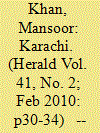

|
|
|
| 16 |
ID:
103757
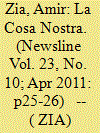

|
|
|
| 17 |
ID:
106834
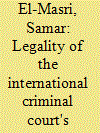

|
|
|
| 18 |
ID:
056033
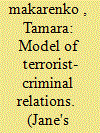

|
|
|
| 19 |
ID:
086360
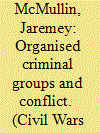

|
|
|
|
|
| Publication |
2009.
|
| Summary/Abstract |
The relationship between criminality and conflict subverts traditional assumptions about organised crime. Consequently, analysis of the 'criminal' must be anchored to specific conflict contexts rather than to a universal typology of organised criminal groups. Organised crime and conflict are interdependent. In several conflict states, organised crime has exacerbated the level of violence and contributed to conflict's intractability. Conflict, meanwhile, creates unique opportunities for criminality to flourish and amplifies the threat that criminal groups pose to security, development and governance. Unless the peculiar supply and demand dynamics of conflict are addressed by the peace process, law enforcement initiatives alone will fail.
|
|
|
|
|
|
|
|
|
|
|
|
|
|
|
|
| 20 |
ID:
100299
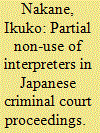

|
|
|
|
|
| Publication |
2010.
|
| Summary/Abstract |
This paper reports findings of a study which examined court proceedings with the presence of an interpreter in Japanese criminal courts. With the increasing awareness of language rights over the last decade and the recent introduction of the saiban-in (lay judge) system, courtroom discourse involving non-Japanese speaking background (NJSB) people is increasingly under scrutiny as an issue of language in public spaces, and improvements have been made in provision of legal interpreting. The present study focuses on partial non-use of the interpreter, an aspect of court interpreting that has been little discussed and hidden behind the published statistics and public discourses on legal interpreting in so-called 'foreigner cases'. It examines which stages of trials are interpreted and which are in Japanese only, and presents an analysis of courtroom interaction involving an NJSB defendant without interpreter mediation. Using Halliday's register framework, the paper discusses courts' decisions regarding partial non-use of interpreters and problems associated with it. While the partial use of interpreters for the highly technical legal genre indicates the courts' effort to provide fair trials for second language speakers, it is argued that a simplistic view of register overlooks the risks involved in not using an interpreter in ostensibly non-technical questioning of the defendant.
|
|
|
|
|
|
|
|
|
|
|
|
|
|
|
|
|
|
|
|
|